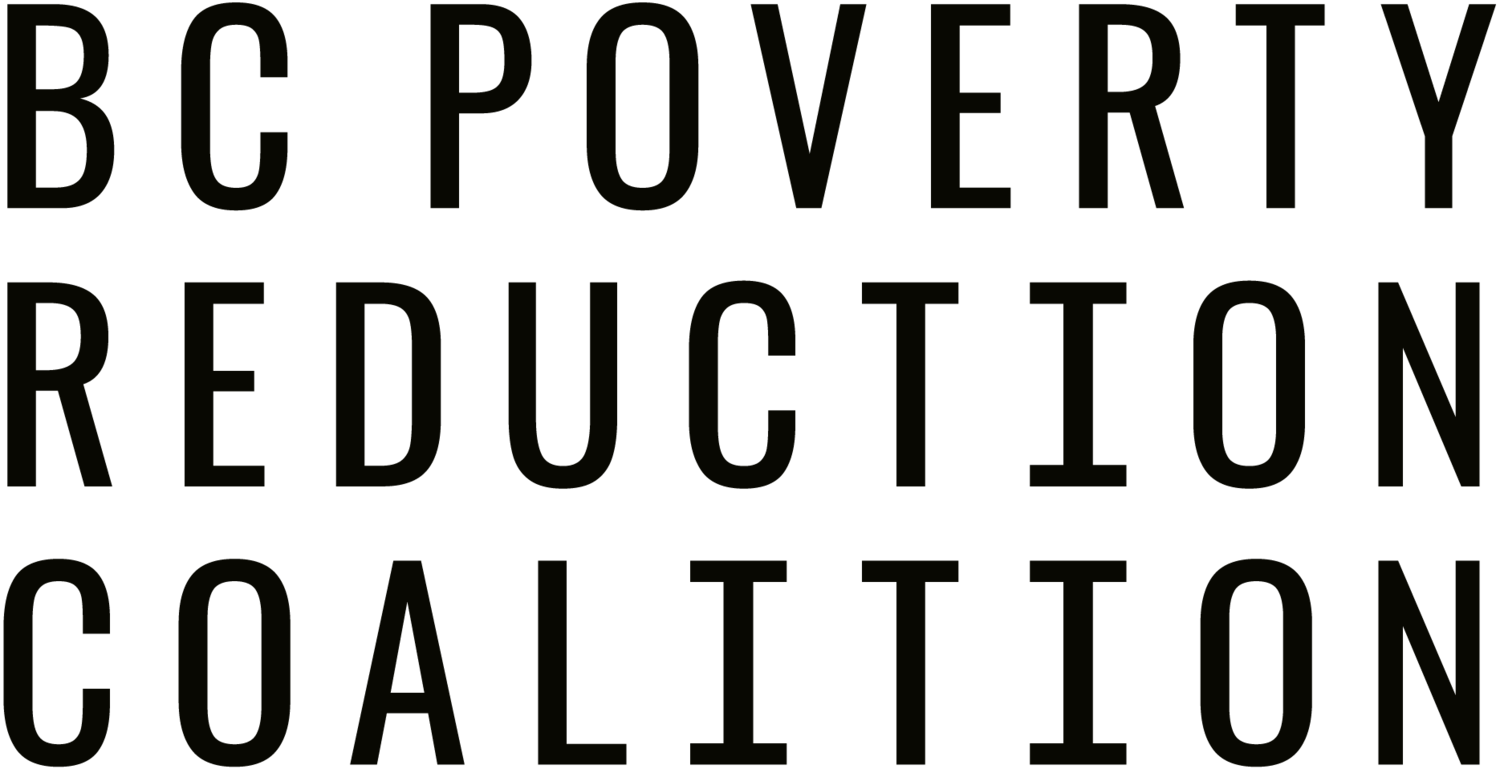
MARCH 2020
The BC Poverty Reduction Coalition expresses support for the implementation of 36 urgent recommendations released by BCPRC members and allies. The recommendations target multiple levels of government, categorized by the BCPRC into the following action areas: Housing Vulnerability, Worker Safety, Health Care, Migrant Rights, Homelessness & At-Risk Neighbourhoods, and Income Protection. The 36 recommendations are listed below.
HOUSING VULNERABILITY
Immediate moratorium on all evictions. (Vancouver Tenants Union, BC ACORN, VDLC, others)
Immediately suspend all mortgage and rent payments until the pandemic is over. (BCGEU)
WORKER SAFETY
Make grocery and pharmacy workers eligible for presumptive workers compensation coverage (UFCW, BCFED)
Presumptive WorkSafe coverage for community health and all community social services workers. (UFCW, BCFED)
Apply limits to the number of shoppers allowed in retail locations.
Provide solutions to workers’ emergency childcare needs. (UFCW)
Ensure that childcare centres that remain open have smaller groups in appropriate spaces to encourage social distancing, and arrival and pick up times are staggered to prevent clusters of people and maintain social distancing. (BCGEU)
Access to paid emergency leave as needed, with a minimum of 21 days for all workers, regardless of immigration status. (Migrant Rights Network)
HEALTH CARE
Access without fear – regardless of immigration status – to free, universal, and expanded healthcare, including testing. (Migrant Rights Network)
Set the health care escalator to 5.2% a year, as agreed upon by the provinces and health advocates. (CCPA)
Create a National Seniors Care Strategy. It would start by ramping up spending on long term care, from 1.3% of GDP to 2% of GDP, with $800 million in the first year, and would target home care funding, which is set to expire in two years. (CCPA)
MIGRANT RIGHTS
Enact an immediate moratorium on all immigration enforcement (detentions and deportations). (Migrant Rights Network)
Work permit and permanent resident status rules must be relaxed or removed, and open permits granted swiftly to workers in transition. (Migrant Rights Network)
HOMELESSNESS & AT RISK NEIGHBOURHOODS
To implement an appropriate and comprehensive COVID-19 pandemic plan for people living in Oppenheimer Park and other homeless people, that is immediately resourced, culturally safe, and actionable. (CCAP and allies)
To immediately open the field housing in Oppenheimer Park and create an emergency on-site screening and triage station. (same as above, and below)
Cease all ‘street sweeps’ and daily displacement of homeless people from public places so they can ‘shelter in place’.
Provide accessible and actionable information to people who are currently living outdoors and in shelters.
Permit empty rooms in SROs to be rented to the homeless if needed by the most vulnerable and in-need homeless people to quarantine or self-isolate.
Provide a meal and food distribution program, on-site mobile hand washing and sanitizing stations, mobile shower and laundry services, and extra washrooms to provide sanitation and minimize the need for lineups and overcrowding.
To provide survival supports for sex workers so that they are not forced into more dire situations due to loss of business.
To put on hold public hearings relating to (municipal) Park Bylaws, conditional injunction and anything else relating to displacement or eviction of homeless people.
Support cleaning in shelters and SROs and inform and educate residents and service providers with information about what people should do and what they can expect.
INCOME PROTECTION
Removal of the waiting period for workers accessing Employment Insurance as a result of COVID-19-related layoffs. (VDLC)
Encourage all retailers to supply workers on duty with masks, sanitizers, and paper towels. (UFCW)
Extend EI benefits to at least 75% of insurable income and reduce barriers to EI. (UFCW)
Reduce the number of working hours required to qualify for EI to 360 hours for regular and special benefits. (CCPA)
Double the EI sickness benefit from 15 weeks to 30 weeks. (CCPA)
Create a $300/week floor on benefits for low-income claimants to EI. (CCPA)
Legislated changes to the Employment Standards Act to secure immediate and retroactive job protection for workers who take sick leave, including workers that self isolate, or are quarantined. (BC FED)
Provision of paid sick leave for all workers, including part-time and casual workers, temporary foreign workers and migrant workers, throughout the duration of isolation or quarantine. (BC FED, VDLC) IN PROGRESS
Access to income supports/transfers for workers that fall outside of current definitions of employees, including independent contractors and the self-employed. (BC FED)
Immediate waiving of any requirement for doctor’s notes for any worker. (BC FED)
Enhancement of Employment Insurance (EI) benefits during the crisis to at least 75% of insurable income, reduction of barriers to access EI, and allocation of extra support staff at Service Canada to help smoothly administer the access to EI. (BC FED) IN PROGRESS
Canada Mortgage and Housing Corporation should immediately provide a pool of capital to existing or new rent banks across the country so that those who can’t make the rent because of falling incomes or illness don’t lose their housing too. (BC ACORN)
Payment freeze on all high interest loans with no penalty. The federal government should also mandate that the banks and major lenders extend the mortgage default period and/or defer mortgage payments over the next six months, as Italy has done. (BC ACORN) IN PROGRESS
Allowing more of the Guaranteed Income Supplement (GIS) to be kept by seniors receiving Canada Pension Plan revenue and increasing the base value of the GIS by up to $1,000 will help sustain these seniors’ incomes. (CCPA)


